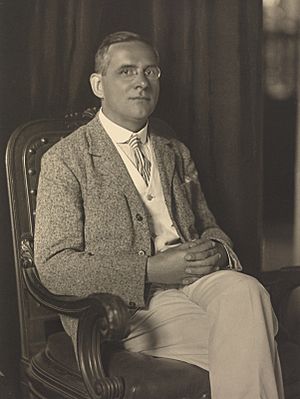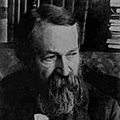Positivism facts for kids
Positivism is a way of thinking that says we get all our knowledge from science. It means we learn about the world by carefully watching things and then using science to understand what we see.
This idea has been around for a long time, from the Ancient Greeks to today. But it really became popular in the early 1800s. A French thinker named Auguste Comte, who also helped start the study of sociology, came up with the main ideas.
Comte believed that human knowledge goes through three stages. First, people explained things with religion. Then, they used more abstract, philosophical ideas. Finally, they reached the scientific stage, which Comte called positivism. He thought that science shouldn't try to find the "ultimate causes" of things. Instead, it should focus on how different facts are connected. Scientists would just explain these connections. Comte also believed that all human knowledge is only "relatively" true, meaning it can change as we learn more. Later scientists, like Heinrich Rudolf Hertz and Ernst Mach, talked about how scientific ideas and laws should be able to predict what will happen in experiments.
Contents
How Positivism Works
Positivism has several key ideas:
- One scientific method: It believes that all sciences, whether studying people (social sciences) or nature (natural sciences), use the same basic way of finding out facts.
- Explain and predict: The main goal of science is to explain why things happen and to predict what will happen next.
- Testable knowledge: Scientific knowledge must be something you can test. You can only prove ideas by actually observing and experimenting, not just by arguing. Research should start with a theory, then create a hypothesis (an educated guess), and then test it with evidence. What you study must be something you can observe with your senses. Just believing something isn't enough.
- Science isn't common sense: Researchers need to be careful not to let their everyday ideas or "common sense" make their research unfair or wrong.
- Value-neutral science: Science should try to be as fair and unbiased as possible. Its goal is to find knowledge, no matter what political views, morals, or values the scientists have. Science should be judged by its logic, and its findings should be true everywhere and always.
- Repeatable experiments: An experiment should be able to show the same results anytime and anywhere it's done.
Unlike people who believe in materialism (that everything is made of matter), positivists don't say what the world is made of. They just say we have information (data) and we try to understand it. For positivists, the idea of a world with three dimensions is just a useful way to understand our daily experiences. If scientists, like astronomers, find new information that doesn't fit this model, they'll need to create a new one. Early 1900s positivists, like Ernst Mach, thought the best model was the "most economical" one – meaning the one that's easiest to use for calculations and predictions.
Auguste Comte also believed that all scientific ideas are only "relatively" true. He even said that Isaac Newton's law of gravity was like a social agreement – true until new information makes us find a better idea.
Logical Positivism: Ideas from Vienna
In the early 1900s, a new idea called logical positivism became important in Vienna, Austria. It was led by thinkers like Moritz Schlick and influenced by Ludwig Wittgenstein.
This idea said that statements were only meaningful if you could prove them to be either true or false. If you couldn't test a statement to see if it was true or false, then it was considered "meaningless." For example, statements like "There is a God" or "There is no God" were seen as meaningless, not true or false, because you can't test them scientifically.
A famous book called Language, Truth and Logic by A. J. Ayer explained this idea in English in 1936.
Operationalism: Defining Things by How We Measure Them
This idea came from P.W. Bridgman, who won the Nobel Prize in Physics in 1946. He said that a scientific idea is defined by how you measure it. For example, ideas like "electron spin" or "the curvature of space" aren't things we see every day. We don't see electrons or curved space directly. These ideas come from experiments that measure basic things like time, light, mass, and electrical charge. Bridgman meant that the meaning of these complex ideas comes from the way we measure them.
Real-Life Examples
- The special theory of relativity uses operational definitions for things like "simultaneous events" (events happening at the same time) and "distance." This means it explains exactly how you would measure these things.
- In quantum mechanics (the science of very tiny particles), operational definitions are linked to "observables." These are definitions based on what can actually be measured.
- Operationalism is used in other sciences too. In psychology, intelligence has often been defined as the score someone gets on a standard IQ test. This can be a bit controversial, because our everyday idea of intelligence is much wider and more complicated.
Auguste Comte's Vision: A "Religion of Humanity"
The original positivism from the 1800s, sometimes called "Comtean positivism," also included a plan for how society would develop. It suggested that societies would move from simple explanations, through religious ideas, to positivism as the main way of thinking and doing science. This idea was very important to people who studied history and culture.
Comte even tried to create a "religion of humanity." This was meant to be a non-religious way of life that would replace traditional religions. However, many scientists who liked his scientific ideas didn't want to create a new religion, and this caused some disagreement.
Today, you can still visit temples built by Comte's followers in cities like Rio de Janeiro, Porto Alegre, and Curitiba in Brazil, and even in Paris. London also had a group of positivists. The Turkish leader Mustafa Kemal Atatürk was very interested in positivism. He used its ideas to help make Turkey a more modern, non-religious country.
Today, the word "positivism" usually refers to a scientific method, not to a secular religion.
Images for kids
-
A portrait of Auguste Comte, the founder of modern positivism.
-
A Positivist temple in Porto Alegre, Brazil.
-
Émile Durkheim, a famous sociologist influenced by positivism.
-
Ernst Mach, an important physicist and philosopher.
-
Stephen Hawking, a famous scientist.
See also
 In Spanish: Positivismo para niños
In Spanish: Positivismo para niños
 | Victor J. Glover |
 | Yvonne Cagle |
 | Jeanette Epps |
 | Bernard A. Harris Jr. |








